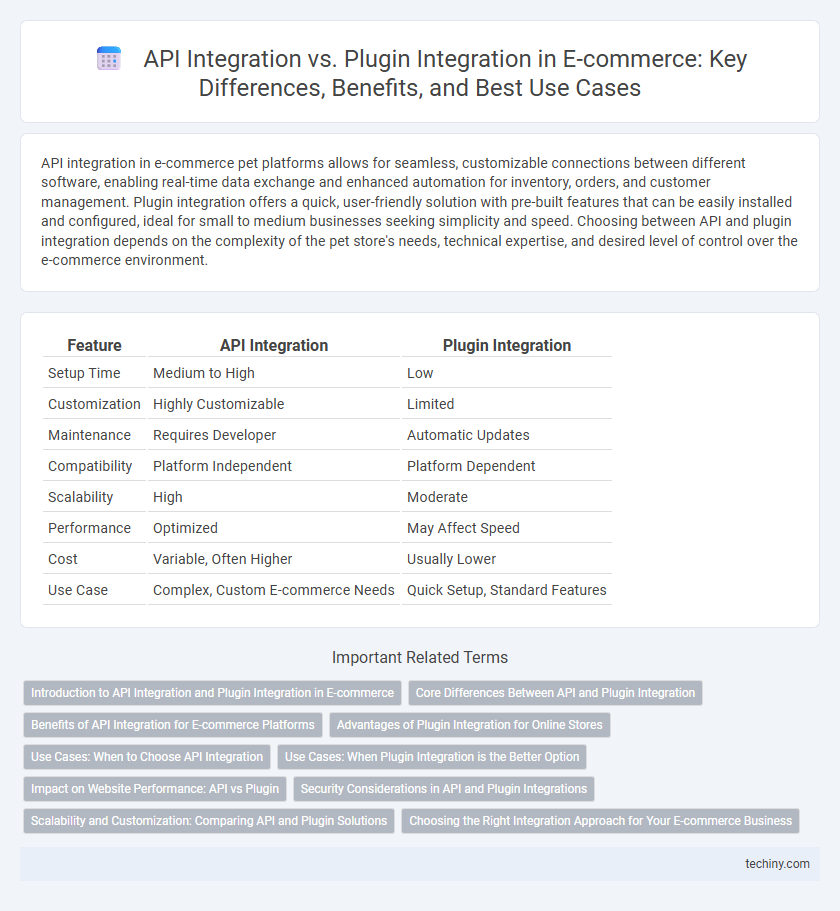API integration in e-commerce pet platforms allows for seamless, customizable connections between different software, enabling real-time data exchange and enhanced automation for inventory, orders, and customer management. Plugin integration offers a quick, user-friendly solution with pre-built features that can be easily installed and configured, ideal for small to medium businesses seeking simplicity and speed. Choosing between API and plugin integration depends on the complexity of the pet store's needs, technical expertise, and desired level of control over the e-commerce environment.
Table of Comparison
| Feature | API Integration | Plugin Integration |
|---|---|---|
| Setup Time | Medium to High | Low |
| Customization | Highly Customizable | Limited |
| Maintenance | Requires Developer | Automatic Updates |
| Compatibility | Platform Independent | Platform Dependent |
| Scalability | High | Moderate |
| Performance | Optimized | May Affect Speed |
| Cost | Variable, Often Higher | Usually Lower |
| Use Case | Complex, Custom E-commerce Needs | Quick Setup, Standard Features |
Introduction to API Integration and Plugin Integration in E-commerce
API integration in e-commerce enables seamless communication between different software systems, allowing real-time data exchange for inventory, orders, and customer information. Plugin integration provides pre-built modules that easily add specific functionalities like payment gateways or shipping calculators to e-commerce platforms without custom coding. Both methods enhance platform capabilities, but API integration offers greater flexibility and scalability for complex workflows.
Core Differences Between API and Plugin Integration
API integration enables seamless data exchange between disparate e-commerce systems through custom-coded connections, offering greater flexibility and scalability for complex business workflows. Plugin integration involves pre-built modules that easily connect specific features to e-commerce platforms without extensive coding, ideal for quick deployment but limited customization. The core difference lies in API's tailored interoperability versus plugin's ready-to-use simplicity, impacting customization, control, and integration depth.
Benefits of API Integration for E-commerce Platforms
API integration enables seamless connectivity between diverse e-commerce systems, enhancing real-time data synchronization and reducing manual errors. It offers greater customization and scalability, allowing online stores to tailor functionalities and support rapid growth without limitations. Improved security protocols within APIs ensure safer transactions and data exchange compared to traditional plugin integrations.
Advantages of Plugin Integration for Online Stores
Plugin integration offers online stores seamless installation and user-friendly customization, enabling merchants to quickly add features without extensive coding knowledge. It provides robust compatibility with popular e-commerce platforms like Shopify, WooCommerce, and Magento, ensuring smooth updates and reliable performance. This approach reduces development time and costs while enhancing scalability and maintainability for growing businesses.
Use Cases: When to Choose API Integration
API integration is ideal for e-commerce platforms requiring custom workflows, complex data synchronization, and real-time inventory management across multiple channels. It supports scalable solutions for businesses with unique operational needs, such as personalized user experiences and advanced analytics integration. Choosing API integration enables seamless connections with third-party services, facilitating automation and enhancing overall platform flexibility.
Use Cases: When Plugin Integration is the Better Option
Plugin integration is the better option for e-commerce platforms that require quick deployment and user-friendly installation without extensive coding knowledge. It is ideal for small to medium-sized businesses that need standard functionalities like payment gateways, inventory sync, or marketing tools without custom development. In cases where seamless updates, compatibility, and minimal maintenance are priorities, plugin integration ensures efficient and cost-effective solutions.
Impact on Website Performance: API vs Plugin
API integration typically offers faster data processing and lower latency, improving website load times and overall performance by directly connecting e-commerce platforms with external services. Plugin integration can introduce additional code and resource overhead, potentially slowing page speed and increasing server load due to less optimized or bulky scripts. Efficient API usage enables scalable, seamless performance enhancement, while poorly maintained plugins may degrade user experience and increase bounce rates.
Security Considerations in API and Plugin Integrations
API integration offers enhanced security by enabling direct, encrypted communication between systems with customizable authentication protocols such as OAuth and token-based access. Plugin integrations, while easier to install, may introduce vulnerabilities due to third-party code dependencies and less frequent security updates, increasing the risk of unauthorized access or data breaches. Proper API security practices, including rate limiting and secure key management, significantly reduce exposure to cyber threats compared to generic plugin implementations.
Scalability and Customization: Comparing API and Plugin Solutions
API integration offers superior scalability and customization for e-commerce platforms by enabling direct control over data flow and system functionalities, adapting seamlessly to growing business needs. Plugin integration provides faster setup with pre-built features but often limits deep customization and struggles to scale efficiently as transaction volumes or feature requirements increase. For businesses prioritizing long-term growth and tailored solutions, API integration ensures a more flexible and robust infrastructure compared to plugin-based approaches.
Choosing the Right Integration Approach for Your E-commerce Business
API integration offers greater customization and scalability for e-commerce businesses seeking to tailor workflows and manage complex data exchanges, while plugin integration provides quicker deployment and simplified maintenance with pre-built modules designed for popular platforms like Shopify and WooCommerce. Selecting the right approach depends on factors such as technical expertise, budget, desired flexibility, and long-term growth plans. Businesses aiming for seamless scalability and personalized functionality should prioritize API integration, whereas those needing immediate solutions with minimal development resources may benefit more from plugin integration.
API Integration vs Plugin Integration Infographic

 techiny.com
techiny.com